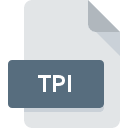.TPI File Extension

EDIUS Plugin File
| Developer | Thomson |
| Popularity | |
| Category | Plugin Files |
| Format | .TPI |
| Cross Platform | Update Soon |
What is an TPI file?
.TPI files are associated with EDIUS, a professional video editing software developed by Grass Valley.
These files serve as plugin files used to extend the functionality of EDIUS by adding new features, effects, transitions, or utilities to the software.
More Information.
EDIUS has a long history of development, with roots dating back to the early 2000s. The introduction of the .TPI file format expanded the software’s capabilities by enabling third-party developers to create and distribute plugins that integrate seamlessly with EDIUS.
Initially, plugins were developed to address specific needs or workflows in video production, such as color correction, audio processing, or special effects.
Origin Of This File.
The .TPI file format was introduced by Grass Valley as a way to package and distribute plugins for EDIUS.
These plugins enhance the capabilities of EDIUS, providing users with additional tools and options to create professional-quality video projects.
File Structure Technical Specification.
.TPI files are essentially compressed archives containing the files and resources required for the plugin to function within EDIUS. While the exact structure and contents of .TPI files may vary depending on the plugin’s functionality and complexity, common components include:
- Executable Code: Binary or script files containing the plugin’s code, algorithms, or processing logic.
- Resources: Images, icons, audio/video files, or other media assets used by the plugin for user interfaces or media processing.
- Metadata: Information about the plugin, such as its name, version, author, and compatibility with different versions of EDIUS.
- Documentation: Readme files, user guides, or other documentation providing information about the plugin’s features, usage, and installation instructions.
How to Convert the File?
Converting .TPI files to other formats are generally not necessary, as they are specifically designed for use with EDIUS.
Users may need to extract or modify the contents of .TPI files for various purposes, such as customization or troubleshooting. Conversion methods can vary depending on the specific requirements and tools available. Common approaches include:
- Decompression: Extract the contents of .TPI files using standard archive extraction utilities such as WinRAR or 7-Zip.
- Modification: Make any desired changes or modifications to the extracted files, such as editing code, updating resources, or adjusting metadata using a text editor or development environment.
- Repackaging: Once modifications are complete, repackage the modified files into a new .TPI file using the appropriate compression format, ensuring that the directory structure and metadata are preserved.
Advantages And Disadvantages.
Advantages:
- Expanded Functionality: .TPI files allow users to extend the functionality of EDIUS by adding new features, effects, transitions, or utilities to the software, enhancing its capabilities for video editing and post-production.
- Customization: Plugins can be tailored to specific needs or workflows, enabling users to customize EDIUS to suit their preferences and requirements.
- Third-party Development: The availability of .TPI files encourage third-party developers to create and distribute plugins for EDIUS, fostering innovation and diversity in the ecosystem of add-on tools and utilities.
Disadvantages:
- Compatibility Issues: Plugins developed for one version of EDIUS may not be compatible with newer or older versions of the software, leading to potential compatibility issues or limitations.
- Quality Control: Not all .TPI plugins may be of the same quality or reliability, and users should exercise caution when downloading and installing plugins from untrusted sources to avoid potential stability or security risks.
- Performance Impact: Some plugins may impact the performance or stability of EDIUS, particularly if they are poorly optimized or resource-intensive.
How to Open TPI?
Open In Windows
- Download and install EDIUS from the official Grass Valley website or authorized resellers.
- Launch EDIUS and navigate to the Plugins menu.
- Choose the option to install or manage plugins, then locate and open the .TPI file containing the plugin you want to use.
- Follow the prompts to install the plugin, and it will be available for use within EDIUS.













